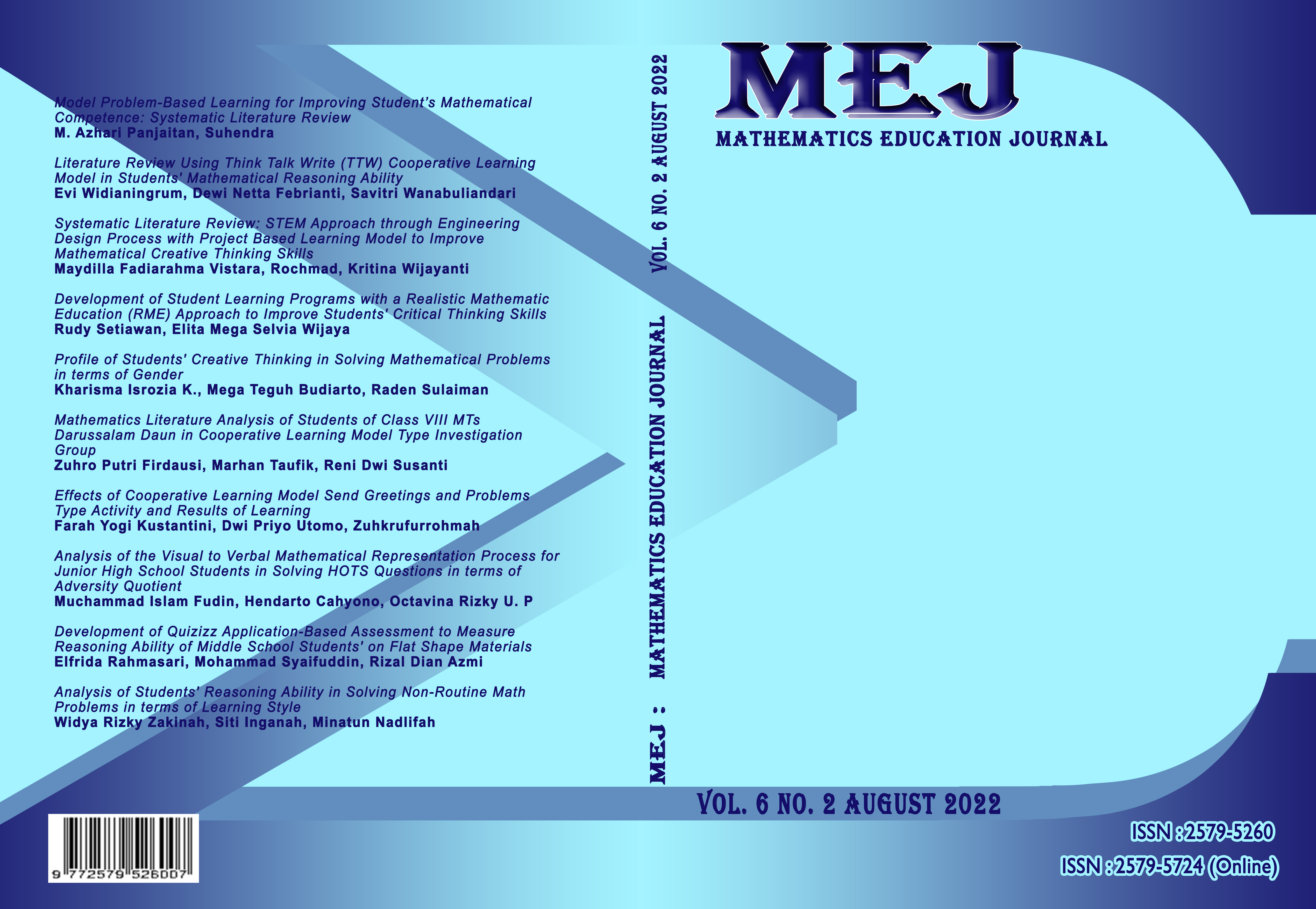Effects of Cooperative Learning Model Send Greetings and Problems Type Activity and Results of Learning
DOI:
https://doi.org/10.22219/mej.v6i2.17580Abstract
This research is an experimental study whose purpose is to determine whether there is an effect of the cooperative learning model type sending greetings and sending questions on the activities and learning outcomes of vocational students' mathematics. The subjects of this study were students of X-KPW 1 and X-KPW 2 of SMK Muhammadiyah 1 Malang City in the 2020/2021 academic year as many as 20 people in each class. To collect data about mathematics learning activities, students use observation sheets during learning activities and learning outcomes tests are used to determine students' mastery of learning materials. Then the data obtained were analyzed with a quantitative approach. Based on the MANOVA test, the significance value of activity and learning outcomes is 0.000, which means that H0 is rejected. The conclusion is that the cooperative learning model of sending greetings and questions has a significant influence on student activities and learning outcomes there are differences in the average activity and learning outcomes of students using conventional learning.
Downloads
References
Amirullah, A. (2015). Peningkatan Mutu Pendidikan. Jurnal Studi Islam, 10(2). Retrieved from http://ejournal.kopertais4.or.id/tapalkuda/index.php/pwahana/article/view/2688/1972
Anwar, Y. A. S., & Haris, M. (2011). Pembelajaran Kooperatif Berkirim Salam Dan Soal Untuk Meningkatkan Aktivitas Dan Hasil Belajar Mahasiswa Pendidikan Matematika FKIP UNRAM Pada Mata Kuliah Kimia Dasar. Jurnal Pijar Mipa, VI(1), 5–8. Retrieved from http://www.jurnalfkip.unram.ac.id/index.php/JPM/article/view/118
Baeti, N., & Mikrayanti, M. (2018). Pengaruh Penerapan Model Pembelajaran Kooperatif Teknik Berkirim Salam dan Soal Terhadap Kemampuan Pemahaman Matematis Siswa SMP. Jurnal Ilmiah Mandala Education, 4(2), 189–194. https://doi.org/http://dx.doi.org/10.36312/jime.v4i2.474
Bey, A., & Asriani. (2013). Penerapan Pembelajaran Problem Solving untuk Meningkatkan Aktivitas dan Hasil Belajar Matematika pada Materi SPLDV. Jurnal Pendidikan Matematika, 4(2). https://doi.org/https://dx.doi.org/10.36709/jpm.v4i2.2035
Bungsu, Titin, K., Akbar, P., & Bernard, M. (2018). Pengaruh Kemandirian Belajar Terhadap Hasil Belajar Matematika Di SMKN 1 Cihampelas Pengaruh Kemandirian Belajar Terhadap Hasil Belajar Matematika Di Smkn 1 Cihampelas. Journal on Education, 01(02), 382–389. https://doi.org/https://doi.org/10.33373/pythagoras.v9i1.2293
Indy, Ryan, Waani, F. J., & Kandowangko, N. (2019). Peran Pendidikan dalam Proses Perubahan Sosial di Desa Tumaluntung Kecamatan Kauditan Kabupaten Minahasa Utara. HOLISTIK, Journal Of Social and Culture, 12(4). Retrieved from https://ejournal.unsrat.ac.id/index.php/holistik/article/view/25466
Mariyanti, S. (2019). Penerapan Model Pembelajaran Berkirim Salam dan Soal untuk Meningkatkan Pemahaman Matematika Materi Barisan Bilangan Siswa Kelas IX D SMPN 3 Kediri. 5(1), 21–31. https://doi.org/https://doi.org/10.29407/pn.v5i1.12866
Monica, L., & Octavia, E. (2019). Pengaruh Model Pembelajaran Cooperative Berkirim Salam Dan Soal Terhadap Hasil Belajar PKN Siswa Kelas VII SMP Negeri 20 Pontianak. 3, 144–152. https://doi.org/http://dx.doi.org/10.31571/pkn.v3i2.1437
Nurzalbiah, S., Djalil, A., & Asnawati, R. (2013). Pengaruh Model Pembelajaran Kooperatif Tipe Tgt Terhadap Aktivitas Dan Hasil Belajar Matematika. Jurnal Pendidikan Matematika Unila, 1–9. Retrieved from https://core.ac.uk/download/pdf/295479442.pdf
Pudjantoro, P. (2016). Penerapan Metode Debat Guna Mengembangkan Sikap Kritis Dan Keterampilan Berargumentasi Mahasiswa. Jurnal Ilmiah Pendidikan Pancasila Dan Kewarganegaraan, 137–144. https://doi.org/http://dx.doi.org/10.17977/jppkn.v28i2.5455
Sakti, N. K., Sihkabuden, & Susilaningsih. (2016). Teknik Pembelajaran Talking Stick Untuk Meningkatkan Aktivitas Dan Hasil Belajar IPA. Edcomtech Jurnal Kajian Teknologi Pendidikan, 137–142.
Setiyorini. (2014). Penerapan Model Pembelajaran Kooperatif Tipe Berkirim Salam Dan Soal Untuk Meningkatkan Hasil Belajar Mata Pelajaran Sosiologi Kelas XI IPS 3 SMA Batik 2 Surakarta Tahun Pelajaran 2013/2014. Antropologi, Pendidikan Sosiologi. Retrieved from https://core.ac.uk/download/pdf/290565143.pdf
Sumarni, N. (2016). Pengaruh Penggunaan Model Pembelajaran Kooperatif dengan Metode Resitasi (Pemberian Tugas) terhadap Hasil Belajar Matematika Siswa Kelas VIII MTs Menaming. Pasir Pengarain: Universitas Pasir Pengarain. Retrieved from https://www.neliti.com/publications/110139/pengaruh-penggunaan-model-pembelajaran-kooperatif-dengan-metode-resitasi-pemberi
Susilowati, I. (2017). Peningkatan Aktivitas Dan Hasil Belajar Materi Fungsi Komposisi Dan Fungsi Invers Menggunakan Model Pembelajaran Kooperatif Teknik Berkirim Salam Dan Soal ( Studi Kasus Pada Kelas XI IPS 3 SMA Negeri 1 Cepiring Semester 2 Tahun Pelajaran 2015/2016). Majalah Ilmiah Inspiratif, 2, 1–13. Retrieved from http://jurnal.unpand.ac.id/index.php/INSPI/article/view/632
Utami, S., Arcat, & Hardianto. (2015). Penerapan Model Pembelajaran Kooperatif Teknik Berkirim Salam Dan Soal Terhadap Hasil Belajar Matematika Siswa Kelas IX SMP Muhammadiyah Rambah. Universitas Pasir Pengaraian, 1–5. Retrieved from https://www.neliti.com/publications/110072/penerapan-model-pembelajaran-kooperatif-teknik-berkirim-salam-dan-soal-terhadap
Yahya, A., & Bakri, N. W. (2020). Pembelajaran Kooperatif Tipe Rotating Trio Exchange Untuk Meningkatkan Aktivitas Dan Hasil Belajar Matematika Siswa. Jurnal Analisa, 6(1), 69–79. https://doi.org/https://doi.org/10.15575/ja.v6i1.8399
Downloads
Published
Issue
Section
License
Copyright (c) 2022 Kustantini Farah Yogi, Dwi Priyo Utomo, Zuhkrufurrohmah

This work is licensed under a Creative Commons Attribution-ShareAlike 4.0 International License.
Authors who publish with MEJ (Mathematics Education Journal) agree to the following terms:
For all articles published in MEJ, copyright is retained by the authors. Authors give permission to the publisher to announce the work with conditions. When the manuscript is accepted for publication, the authors agree to automatic transfer of the publishing right to the publisher.
Authors retain copyright and grant the journal right of first publication with the work simultaneously licensed under a Creative Commons Attribution-ShareAlike 4.0 International License that allows others to share the work with an acknowledgment of the work's authorship and initial publication in this journal.
Authors are able to enter into separate, additional contractual arrangements for the non-exclusive distribution of the journal's published version of the work (e.g., post it to an institutional repository or publish it in a book), with an acknowledgment of its initial publication in this journal.
Authors are permitted and encouraged to post their work online (e.g., in institutional repositories or on their website) prior to and during the submission process, as it can lead to productive exchanges, as well as earlier and greater citation of published work (See The Effect of Open Access).

This work is licensed under a Creative Commons Attribution-ShareAlike 4.0 International License.










